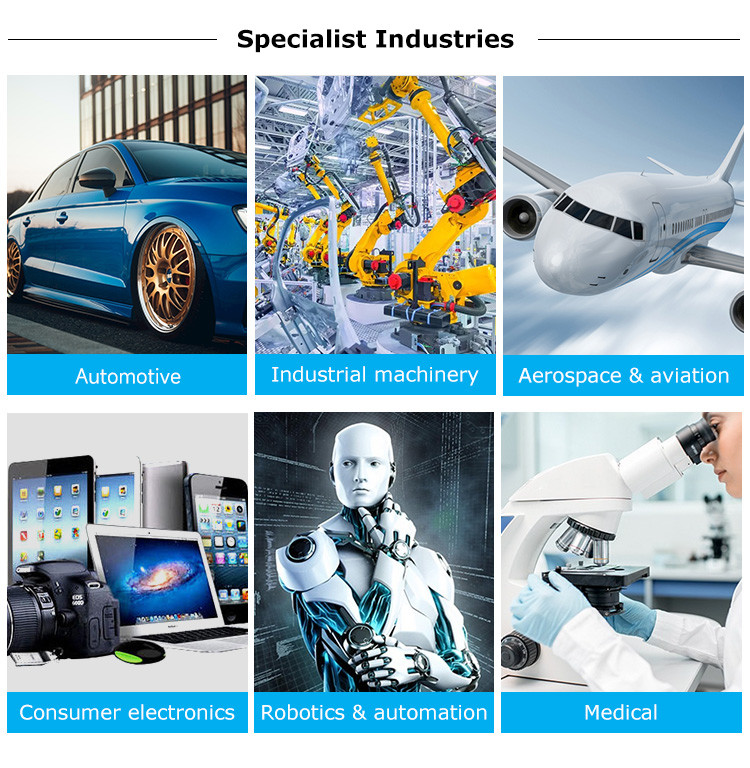Dongguan Yexin Intelligent Technology Co., Ltd. |
|
Verified Suppliers
|
|
CNC Machining Stabilizers Anodized Aluminum 6061 Parts Cheap OEM Precision
CNC Machining Parts Services Turning Parts
CNC machines offer numerous advantages in the manufacturing industry.
They can operate with minimal operator intervention and have the potential to run continuously,
24/7, especially when integrated with robotic systems for loading and unloading.
CNC machines provide consistent and repeatable accuracy, ensuring minimal dimensional variations
between thousands of produced parts.
Additionally, CNC machines are capable of creating intricate and complex features that would be
challenging to achieve with manual machines.
Product Details
Cost Considerations for CNC Machining Materials
The cost of materials in CNC machining can fluctuate significantly
due to the extensive array of
available options. Each material carries its unique price tag, and the inherent physical properties
of each material play a substantial role in determining machining costs.
For those seeking to manufacture metal components, Aluminum 6061 stands out as the most
cost-effective choice.
On the other hand, ABS ranks as the most budget-friendly option among materials.
As for the influence of machining complexity on costs, stainless steel serves as an illustrative example.
Its inherent hardness, surpassing that of aluminum, renders it more challenging to machine,
consequently elevating the overall machining expenses.
Here is a comprehensive overview of the most popular materials.
| The Most Popular Materials | |
| Name | Characteristics |
| Aluminum 6061 | Good strength-to-weight ratio, excellent machinability, low hardness |
| Stainless Steel 304 | Excellent mechanical properties, resistant to corrosion & acid, relatively difficult to machine |
| Brass C360 | High ductility, excellent machinability, good corrosion resistance |
| ABS | Excellent impact resistance, good mechanical properties, susceptible to solvents |
| Nylon (PA6 & PA66) | Excellent mechanical properties, high toughness, poor moisture resistance |
| POM (Delrin) | High stiffness, excellent thermal & electrical properties, relatively brittle |




| Surface Finishes | ||
| Name | Applicable to | Machining marks |
| As machined | Metals, Plastics | Visible, light surface scratches |
| Smooth machining | ||
| Fine machining | Metals | Slightly visible |
| Polishing | Metals | Removed on primary surfaces |
| Bead blasting | Metals | Removed for non-cosmetic, removed on primary surfaces for cosmetic |
| Brushing | Metals | |
| Anodizing Type II | Aluminum | |
| Anodizing Type III | Aluminum | Visible under anodizing |
| Black oxide | Copper, Stainless steel, Alloy steel, Tool steel, Mild steel | Visible |
| Powder coating | Metals | Removed |
| Brushed + electropolishing | Stainless steel | Removed on Primary surfaces |
Specialist Industries
CNC machines exhibit the capability to precisely and repeatedly cut nearly any metal alloy and rigid
plastic, making them suitable for custom machined parts in a wide range of industries, including
aerospace, medical, robotics, electronics, and industrial applications.

Company Profile


FAQ's
1. What are the Materials Used in CNC Machining?
CNC machining is a versatile process employed across a wide range of materials, each with its own
ideal machining parameters, including speeds and feeds.
Here are some of the most common materials used:
1. Metals
Metals are the most frequently machined materials, ranging from
easily workable brass to robust
nickel superalloys like Inconel.
CNC machining in metal finds application in various industries, including the production of injection
molds,shafts, and gears.
2. Plastics
While injection molding is the primary method for plastic part
production, CNC machining is utilized
for specific plastic components.
Common plastic materials include ABS (acrylonitrile butadiene styrene), nylon, and polycarbonate.
Plastic CNC machining is suitable for valve bodies, bushings, and prototypes to assess part
functionality before investing in costly molds.
3. Wood
CNC routers are commonly employed for wood cutting, offering a
cost-effective alternative to
metal-cutting CNC machines.
Wood CNC machining is often used for decorative purposes, such as crafting furniture, window frames,
andornamental panels.
4. Foam
Polyurethane foam, both closed-cell and open-cell varieties, is
frequently used in CNC machining
applications.
CNC routers can shape foam blocks to create custom packaging for high-value items, such as toolboxes
designed to securely transport tools.
5. Composites
CNC machines play a crucial role in processing composite materials
like aramid, fiberglass, and carbon fiber.
These abrasive materials require precise machining to add fastener holes and trim components in
industries like aerospace and marine manufacturing.
2. What tolerances can be achieved?
Tolerances are not standardized across all processes and materials.
The final tolerances on your part depend on various factors, such as part size, design complexity,
the number and size of features, materials used, surface finish, and the manufacturing process employed.
Once your order is confirmed, we conduct a Design for Manufacturing review to identify areas that may
need modification for better manufacturability.
It's helpful if you can specify which areas in your design have critical tolerances that must be met and
which can be adjusted, if necessary, to optimize production time and cost.
Here are some general tolerance guidelines:
General tolerances for CNC machining in metal and plastic.
Tolerances for plastic injection molding.
Reference charts for CNC machining of metals and plastic injection
molding materials.
General tolerance for metal 3D printing is +/- 0.5mm.
A shrinkage rate of +/- 0.15% can be expected for vacuum casting.
All manufacturing and technical specifications must be clearly
defined in the 2D drawings to be
followed accurately.